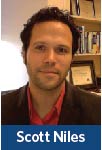I would venture to presume that most people are, at best, leery of change. When I accepted the Director of Research Integrity and Compliance position here at Morehead State University nearly a year ago, I certainly was concerned about the change from my pre-award duties to my new compliance, IRB, and IACUC duties. While I did the best I could to educate myself on these new job responsibilities, I found the work surrounding IACUCs and the entire realm of animal care and use the most daunting by far. In fact, I can remember my nervousness as I attended my first IACUC meeting—surrounded as I was by numerous animal science experts and two veterinarians, who was I to be any voice of authority?
However, while change is challenging, it also presents an opportunity to adapt, to learn, and to grow. And as luck would have it, facing this period of change in my work, my predecessor mentioned I might want to explore PRIM&R as a potential resource. Looking back now at six months of PRIM&R membership, including my attendance at my first IACUC Conference, I can honestly say it has been the single most helpful and encouraging guide through the quagmire of running an effective and compliant animal research program!
In my research administration career, I have participated in several daylong, basic-level courses on a variety of topics from proposal development to sponsored projects accounting, and IACUC 101: The Basics—which I attended as a pre-conference program at PRIM&R’s 2017 IACUC Conference (IACUC17)—was truly one of the most comprehensive, informative and practically useful workshops I have attended. In fact, the formidable binder full of information and resources that was provided to attendees during the course has remained close at hand on my desk since March and is an often-used reference. Just a few weeks ago, I reexamined the section on semi-annual reviews as I prepared to lead my first facilities inspection. The advice on these inspections offered in IACUC 101: The Basics emphasized that “every visit is an opportunity to educate,” which helped reframe my thinking from punitive to supportive.
In addition, conference sessions expanded on the basics from this course with more in-depth discussion of specific aspects of animal care and use programs. This provided me the opportunity to take what I learned in IACUC 101 and adapt it to specific scenarios, such as managing the USDA inspection process, the IACUC’s role in the use of controlled substances, and managing animal care in smaller organizations. Each session featured friendly and knowledgeable speakers, and some handouts even included accompanying articles and references, which allowed me to gain an even broader context.
Finally, the most useful (and fun) part of IACUC2017 was meeting so many wonderful, intelligent IACUC professionals willing to impart knowledge onto neophytes like myself. Sometimes, a 15-minute conversation with an experienced practitioner can be just as beneficial as a conference session, as it puts questions and issues into our own real-life scenarios. In fact, I have already reached out to several individuals that I met onsite to solicit advice and suggestions.
In learning by doing, I feel as if I am finally learning and growing my animal care and use knowledge. Further, having a network of individuals to lean on has allayed my nervousness and imbued a sense of confidence in my daily work. So, while change is often perceived as something to fear, armed with the right mindset, the proper tools, and a strong network, professional change can be an opportunity for something great. This sentiment encapsulates my experience joining PRIM&R and attending IACUC17!
Scott Niles, PhD, CRA, is the Director of Research Integrity and Compliance at Morehead State University (MSU) in Morehead, KY. Dr. Niles has more than 12 years’ experience as a grant writer and research administrator. In his current role as compliance director, Dr. Niles oversees the daily and long-range compliance management of grants and contracts, including sub-award negotiation, sub-recipient monitoring and the Responsible Conduct of Research. As MSU’s Institutional Official, he also directs the IACUC, the IRB, and the Intellectual Property Committee.


No comments! Be the first commenter?